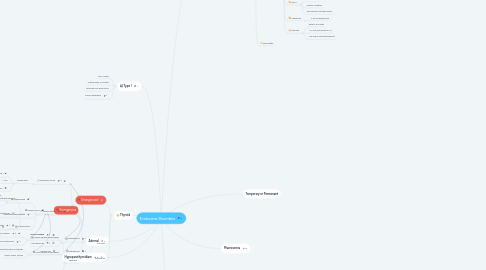
1. Type I
1.1. ~5% of cases
1.2. Autoimmune, incurrable
1.3. Total beta cell destruction
1.4. Insulin-dependent
2. Hypoparathyroidism
3. Adrenal
3.1. Emergencies
3.1.1. Adrenal Crisis
3.1.1.1. Electrolyte disturbances
3.1.1.1.1. Hyponatremia
3.1.1.1.2. Hyperkalemia
3.1.1.2. GI disturbances
3.1.1.2.1. Fluids
3.1.1.2.2. Zofran
3.1.1.3. Solu-cortef
3.2. Disorders
3.2.1. Chronic adrenal insufficiency
3.2.1.1. Addison's disease
3.2.1.2. Secondary adrenal insufficiency
3.2.2. Acute adrenal insufficiency
3.2.2.1. Abrupt discontinuation of steriods
3.2.2.2. Stress, illness, trauma
3.2.3. Hyperadrenalism
3.2.3.1. Cushing's Syndrome
3.2.3.1.1. Moon face
3.2.3.1.2. Central obesity
3.2.3.1.3. Buffalo hump
3.2.3.1.4. Striae
3.2.3.2. Pheochromocytoma
4. Thyroid
4.1. Emergencies!
4.1.1. Myxedema Coma
4.1.1.1. Bradycardia
4.1.1.1.1. Atropine
4.1.1.1.2. TCP
4.1.1.1.3. Ionotropes
4.1.2. Thyroid Storm
4.1.2.1. Hyperpyrexia
4.1.2.1.1. Tylenol
4.1.2.1.2. ASA
4.1.2.2. Adrenergic hyperactivity
4.1.2.2.1. Propranolol
4.1.2.2.2. Corticosteroids
4.1.2.3. GI dysfunction
4.1.2.3.1. Aggressive hydration
4.2. Disorders
4.2.1. Hyperthyroid
4.2.1.1. Grave's Disease
4.2.1.2. Thyrotoxicosis
4.2.2. Hypothyroid
4.2.2.1. Hashimoto's
4.3. Parathyroid
5. Temporary or Permenant
6. Macrosomia
7. Pancreas
7.1. Emergencies
7.1.1. Hyperglycemia
7.1.1.1. DKA
7.1.1.1.1. Pathophysiology
7.1.1.1.2. Treatment
7.1.1.2. HONK
7.1.1.2.1. Pathophysiology
7.1.1.2.2. Treatment
7.1.2. Hypoglycemia
7.1.2.1. Oral glucose
7.1.2.2. IV dextrose
7.1.2.3. IM glucagon
7.2. Disorders
7.2.1. Diet - Oral - Injectables - Insulin
7.2.2. Diabeties
7.2.2.1. Type 2
7.2.2.1.1. Most common - 90%
7.2.2.1.2. Not enough insulin or intolerant
7.2.2.1.3. Lifestyle
7.2.2.2. LADA
7.2.2.2.1. 30-50 yo
7.2.2.2.2. Antibodies like type 1
7.2.2.2.3. Slow destruction of beta cells
7.2.2.2.4. 6 months - 6 years
7.2.2.2.5. Insulin dependent
7.2.2.3. MODY
7.2.2.3.1. Rare
7.2.2.3.2. Before 25 yo
7.2.2.3.3. Genetic mutation
7.2.2.3.4. Pancreas still secretes insulin
7.2.2.4. Gestational
7.2.2.4.1. 2-5% of pregnancies
7.2.2.5. Neonatal
7.2.2.5.1. Birth to 6 months
7.2.2.5.2. 1 in 400,000 infants in US
7.2.2.5.3. Can affect fetal development
7.2.3. Pancreatitis
8. Pituitary
8.1. SIADH
8.1.1. too MUCH ADH
8.1.1.1. anuria
8.1.1.2. relative hyponatremia
8.1.2. NO FLUIDS!
8.2. DI
8.2.1. not enough ADH
8.2.1.1. polyuria
8.2.1.2. polydipsia
9. Thiamine
9.1. Required for glucose to enter Kreb's Cycle
9.1.1. Deficiencies
9.1.1.1. Causes acidosis
9.1.1.1.1. Could theoretically worsen Wernicke's
9.1.1.2. Metabolism stops at pyruvate
9.1.1.3. Caused by malnutrition
9.1.1.3.1. Common in alcoholics
9.2. Given with glucose
9.2.1. Mostly in hospital/long term treatment
